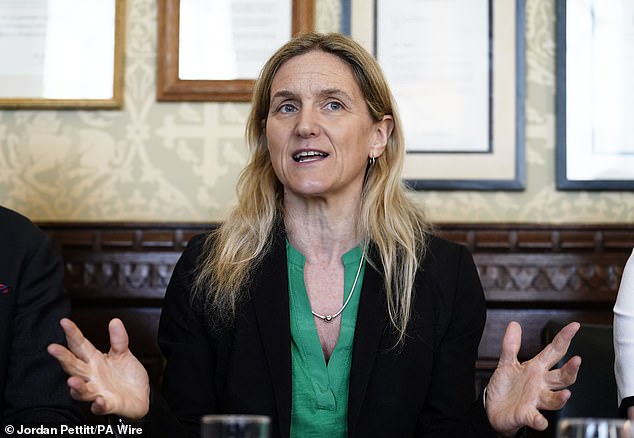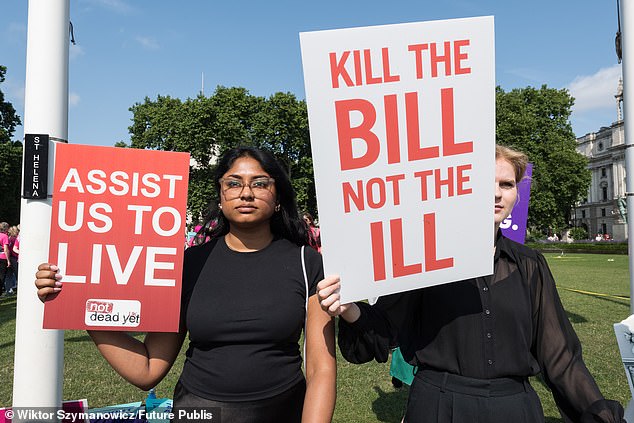By PROFESSOR DAVID S. ODERBERG
The passing of the euphemistically named Terminally Ill Adults (End of Life) Bill is a terrible milestone in the decline of medicine and medical ethics in the UK.
MPs voted for it by a very narrow margin after some withdrew their support following the second reading, and the Bill will now head to the Lords, where it is unlikely to be significantly amended.
Much of the impassioned debate revolved around crucial questions regarding safeguards against abuse, worries about possible coercion, and the need to focus more on palliative care, among many other legitimate and serious concerns.
What seems largely to have escaped scrutiny is this simple fact: our MPs have approved a piece of legislation that is a euthanasia Bill in all but name. Let me explain why.
The Bill makes it clear in multiple places that the person’s death must be ‘self-administered’. Clause 23 is explicit that the ‘coordinating doctor’ is not authorised by the Bill to administer the lethal substance.
All they are allowed to do is ‘prepare’ the substance for self-administration, ‘prepare a medical device’ to enable the patient to self-administer, or ‘assist’ the patient to do so.
The death-dealing act itself must be performed by the patient. Hence there is, technically, no euthanasia – no killing by the doctor of the patient.
There is, however, the smallest of hints that all is not quite as it seems. According to clause 11, the ‘assessing doctor’ must ‘discuss with the person their wishes in the event of complications arising in connection with the self-administration of an approved substance’.

Labour MP Kim Leadbeater’s Terminally Ill Adults (End of Life) Bill will undergo further scrutiny in the Lords
What could that mean? Well, the patient may, quite simply, find it difficult to self-administer. They might bungle it, as should be expected in such a fraught and stressful situation.
Suppose they fail to self-administer despite making all the right requests at the right time. Or, even worse, suppose they partly self-administer but do not finish the job, and they are writhing in agony, not dead but in a terrible state. What then?
I am no prophet, and I will not put a precise timeline on the following – save to say that it will all become clear in a handful of years. This Bill will be modified to allow active killing.
Imagine a patient with motor neurone disease, or advanced multiple sclerosis, or late-stage Huntington’s disease. Suppose, as is likely, they cannot self-administer, yet their request for ‘assisted dying’ is lucid, fixed, and follows the procedures in the Bill. By the letter of the law, their request must be denied.
Yet surely this, from the viewpoint of the legislation’s supporters, would be a perverse outcome. Here is a person in an awful state, who fits the Bill’s definition of someone who is terminally ill (death reasonably expected within six months).
Their circumstances are no different from anyone else entitled to request assisted dying except for the fact that they are physically unable to kill themselves.
Should they be denied the right to a so-called ‘peaceful death’? If so, the supposed injustice would be obvious: they would be, effectively, punished for their own misfortune.
Through no fault of their own, they do not meet the Bill’s criteria. Yet their medical condition could be, in terms of disability and subjective suffering, much worse than that of someone who does fit the bill and is allowed an assisted death.

Campaigners and their supporters gather outside Houses of Parliament to demonstrate their opposition to assisted dying

Protesters against a change in the law on assisted dying hold placards during a demonstration outside Parliament
Could such an ‘unjust’ outcome be what Parliament intended? Clearly not. So what will happen is that euthanasia advocates will, as sure as night follows day, bring a test case involving someone with a dreadful affliction such as one of the ones I just mentioned.
They will say to the court: ‘Your Honour, it is simply unjust and perverse that my client can have no access to assisted dying, simply through no fault of their own, and even though their suffering is among the worst imaginable.’
A judge will then do one of two things. They might appeal to clause 11 and ‘read into’ the legislation an implied legislative intent to allow active killing – euthanasia – in such a ‘rare’ case, and in similar ones.
But I think this would be a stretch too far, judicially speaking. It is more likely that they will disallow euthanasia in the case before them but refer the matter back to Parliament for reconsideration, so as to remedy the unfair and unreasonable outcome of a badly drafted Bill. Badly drafted with intent? That is not for the judge to decide.
So it will go back to Parliament, the boosters of euthanasia will storm the gates (metaphorically), and a sympathetic MP will table an amendment to remedy the injustice.
And, hey presto, you will have euthanasia. The active killing of patients will be the law of the land. Our legislators, who once presided over a system that was the envy of the world for its palliative care, its hospices, its help for the most vulnerable to live out their days with dignity, should hang their heads in shame.
The fact that yesterday’s decision followed Tuesday’s appalling vote to decriminalise abortion up to birth means we have descended yet further into the moral abyss.
- David S Oderberg is Professor of Philosophy at the University of Reading












